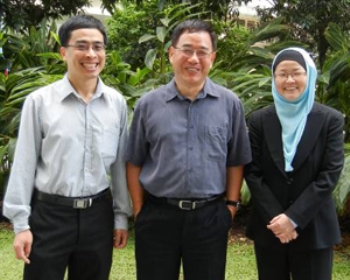Scientists at the Institute of Bioengineering and Nanotechnology (IBN) have made a significant progress in virus-based gene therapy by successfully allowing the virus to evade the human immune system through the integration of two IBN innovations.
 The IBN Research Team (from left to right): Dr Andrew C. A. Wan, Dr Shu Wang and Prof Jackie Y. Ying.
The IBN Research Team (from left to right): Dr Andrew C. A. Wan, Dr Shu Wang and Prof Jackie Y. Ying.
In a paper published in the Advanced Materials journal, the researchers showed that efficient elimination of cancer cells is possible by encasing therapeutic viruses in microfibers or artificial tissue fibers.
Since 2003, IBN has been exploring the purpose of engineered insect virus for cancer and neurological disorder treatment. In 2006, IBN successfully delivered gene to human embryonic stem cells utilizing a baculoviral vector.
In order to help the virus to evade the body’s own defense mechanism to reach the targeted cells, a research team headed by Dr Shu Wang, IBN Group Leader, selected a novel microfiber fabrication method devised by Dr Andrew C. A. Wan at IBN.
Human tissue fibers are the assembly of proteins and DNA. At present, it is difficult to synthesize artificial tissue fibers from more than one kind of biomolecule. IBN scientists overcame this issue by developing synthetic tissue fibers from two different types of biomolecular materials, namely DNA and peptides utilizing a water-based chemical process. In the process, the researchers introduced two droplets of negatively charged DNA molecules and positively charged peptide molecules in water. When get contacted, the droplets joined together to create a two-component fiber due to their opposite charges.
The same process was used in the addition of baculoviral vectors to the DNA solution for coating the virus with the fibers. Since the structure of the synthetic tissue fiber is analogous to that of human tissue fibers, they disguised the virus by inhibiting the human immune system’s ability to identify the virus, thus preventing its premature deactivation. Experiments on mice with brain cancer demonstrated that microfiber-coated viruses were able to considerably hinder the growth of the tumor and demonstrated prolong survival when compared to treatment involving uncoated viruses.